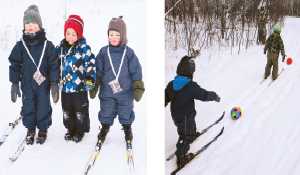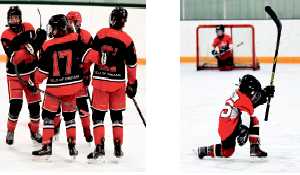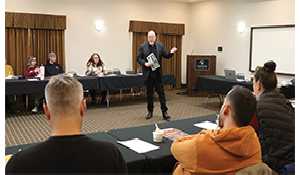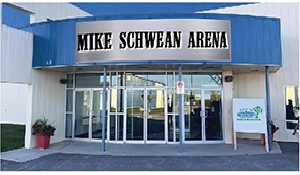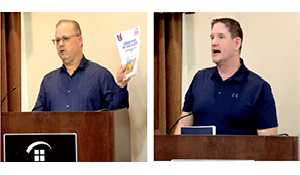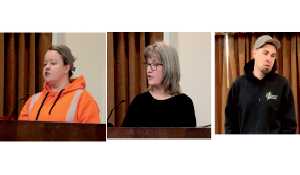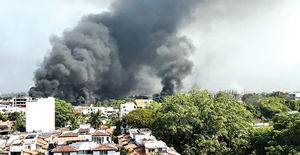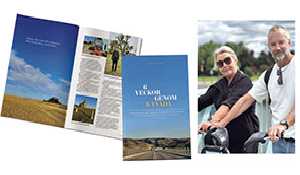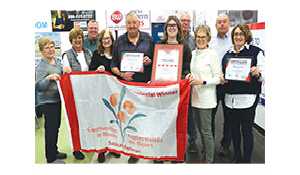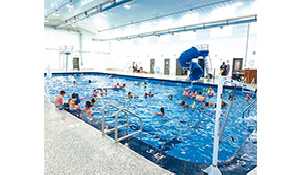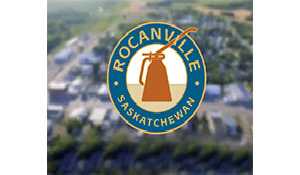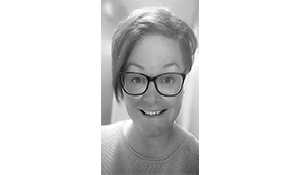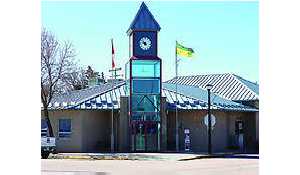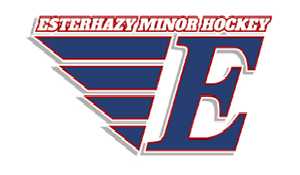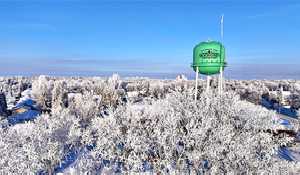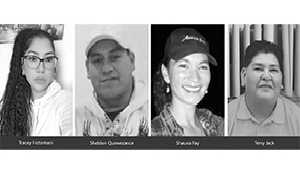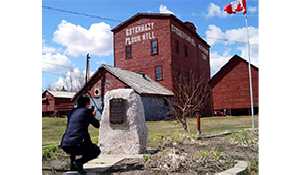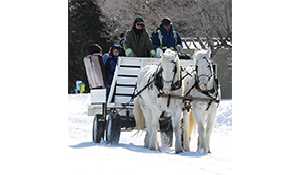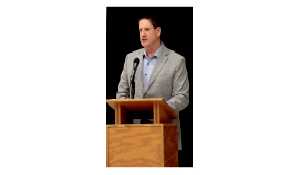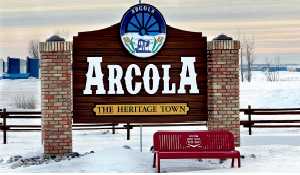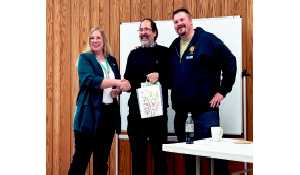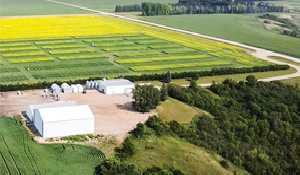Ethier recognized with Coronation Medal
McNaughton vice-principal Jordan Ethier recognized for his contributions
February 10, 2025, 1:20 pm
Ashley Bochek
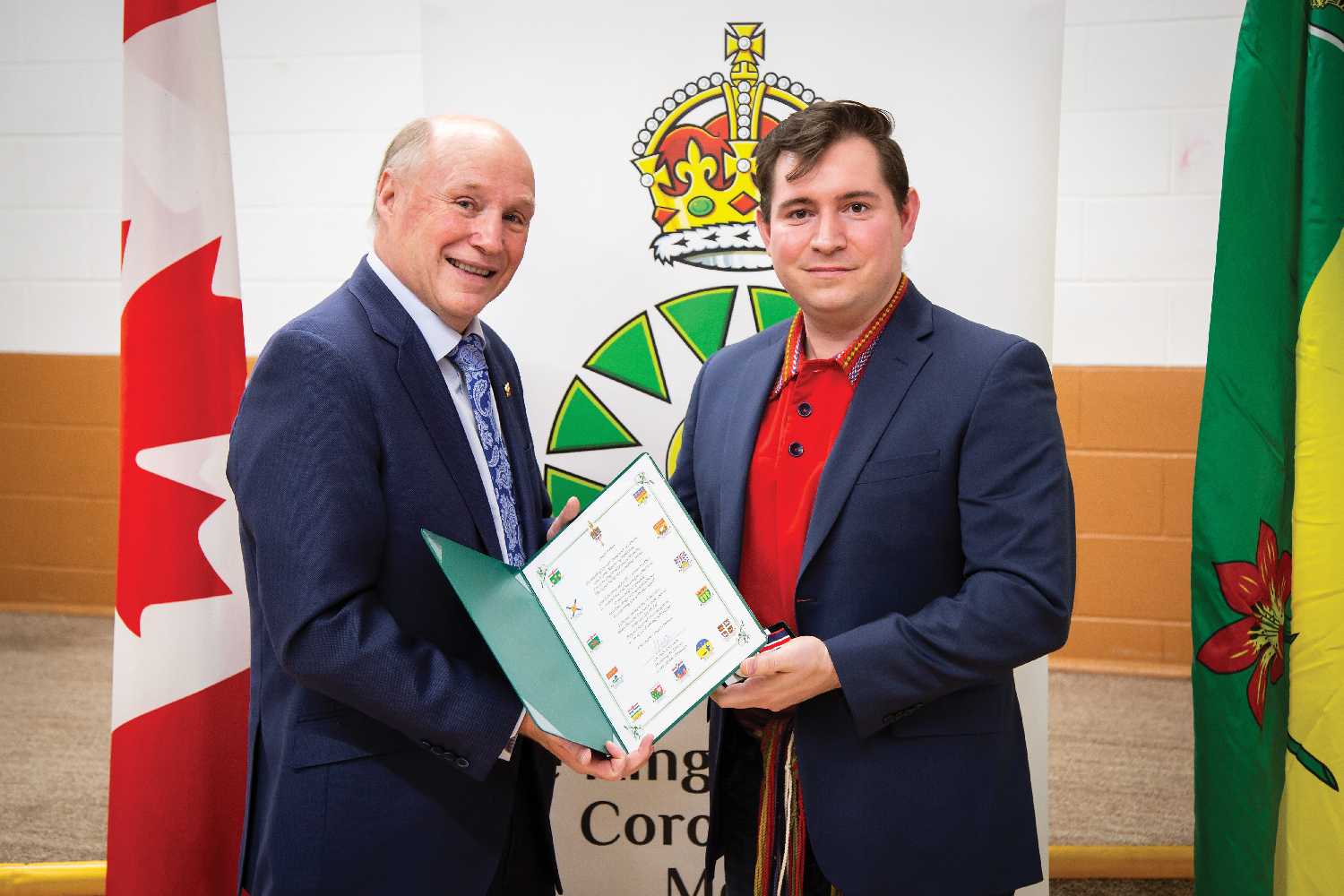

Jordan Ethier, McNaughton High School’s Vice-Principal, was awarded the King Charles III Coronation Medal for his work in community volunteerism, education with a focus on Indigenous education, and his work with the Manitoba Métis Federation.
Ethier grew up in northwest Saskatchewan and lives in Wawota with his family.
“I was born in North Battleford but raised in the Battlefords on a farm outside of the city. My family has lived in the Battlefords area since the late 1800s. So, we have been around that area for a long time. I currently live in Wawota with my wife and two kids. My wife is from Wawota, she is a Lemontagne and her family is from Wawota.”
Education
Ethier attended many universities before finishing his degree in History at the University of Regina.
“When I first graduated from high school I wasn’t entirely sure of what I wanted to do. I thought I wanted to be a military lawyer in the Air Force, or I wanted to be a professor of history at a university. I started at the University of Saskatchewan studying political science and history and then I decided if I was going to pursue the military I needed to improve my French. So, I went to Quebec City where I went to the Université Laval.
“Katelyn, my wife, was living in Regina at the time and we were getting more serious and decided that living across the country and pursuing this military law degree wasn’t conducive to our future plans. Then, I decided to go the route of history professor—my first plan for education was to be a history professor. I then went to the University of Regina and finished a degree in History and certificate in French as a Second Language.
“During this time is when my daughter, Aurora, was born, so with her coming along there was a lot of talk about family stability and immediate plans and although my passion is history and my long-term plan after retirement is still to pursue history in academia, at this time I needed more stability and academia is not that, and it can take a long time to establish yourself as well. Just because you finish your PhD doesn’t mean you miraculously get a job at your ideal location. So then I took a step back and looked at what was truly important to me and what I needed to do to feel satisfied and fulfilled and what I realized was although I had a passion for history it was the prospect of teaching at a university level that had me excited.
“After realizing that, I shifted gears and went into the Education program at the University of Regina, but because of my other studies I could do it quicker—I didn’t have to take the full four years. It is called the after-degree program, so I did that with a major in Social Sciences and a minor in French education. I did my pre-internship at Luther College. That is how I got into education, I realized I wanted those relationships with students, I wanted to try and spark that same passion for learning and that is what moved me in this direction.”
Métis background
Ethier is proud of his Métis heritage.
“It is really important to me. My father is Métis, and it is particularly important on his mother’s side as well, so my grandmother was Elise Ethier and Elise—not that it wasn’t important in other parts of my family—but her family has some significant Métis figures in its lineage—people like Abraham Bélanger Senior, who was present at the March 24, 1884 secret Resistance planning meeting, and a Capitan of one the 19 companies led by Gabriel Dumont during the 1885 North West Resistance.
“His dad was Louis Bélanger, who is Chief Mistawasis’s brother, which shows an interesting interconnectedness of many Métis families and First Nations families, especially during the early days of the Métis Nation. Abraham Bélanger’s son, Abraham Bélanger Junior, fought in one of the regiments at Batoche so in my grandmother’s family there is a lot of involvement in formal Métis politics throughout history and my grandmother had some involvement herself in—before it was called Métis Nation Saskatchewan—there was these catch-all organizations for non-status Indians and Métis people in the 1960s and ‘70s. It was something very much in the fabric of my family’s lineage. The lessons I was taught and stories I was told—like everyone has from their grandparents and parents—mine are Métis stories of resilience, survival, Indigenous lessons and teachings.”
Ethier believes education is built from community and relationships between teachers and their students, and feels his Métis culture has influenced those values and his teaching style.
“To me, good leadership and true education is rooted within community and relationships. It is not this idea that students are these empty vessels that we have to fill with knowledge because we know everything and they know nothing, and it is not just practicing skills like we are some training camp to produce effective workers. Instead, it is about building human capacity, about connecting students with themselves and their community, about me connecting with students on a relationship level and doing that within the context of bettering the wider community whether that be Moosomin or Southeast Saskatchewan, Saskatchewan in general, or the Métis Nation.
“I think that is a very Indigenous worldview, that is very much in Métis teachings of what education is and of what leadership is and so that is one example of how the lessons I have been taught through my family show themselves in my professional life.”
Métis Identity based on cultural stories and values
Ethier explains he believes the cultural stories and values is what makes him Métis and his children Métis.
“To me, what forms my identity is not something I am just connecting to because it is heritage. It is not something I reach back in my family tree to grab, but each generation of my family has been Métis. It is not like there is some five-generation gap. It is not so much that it is important to me in a heritage sense, but it very much is who I am. It’s the lessons I have been taught, the values I hold.
“I am not Métis because of my great-great-great grandfather or something. It is because of who I am. The way I explain it is my children are Métis 100 per cent, not 50 per cent. My son is 100 per cent my son, but also 100 per cent a brother, we understand that you can be a whole something and a whole of another. It is whether or not you are something, we are not dog breeds that are 50 per cent something and 50 per cent another. So, for my children, what makes them Métis and what I hope becomes important to them as adults, are the lessons and stories, and values, and cultural connection that I teach them now because they’re being raised in a Métis household.
“Yes, they are Métis because of heritage, but also because of the lived experience right now. It is important to me for the same reason. I am Métis because my father is Métis and I was raised in a household with those values, that cultural connection, those stories, the fact that my grandmother could speak Michif that kind of stuff. It is important to me because of the cultural connections, the community, the values, the stories, and then the heritage.
“To me, although the heritage is cool and learning about how my great-great grandparents fought in the Northwest Rebellion—that makes for a connection to history that is cool, but that actually is not the most important part of Métis identity for me, it is the lived part.”
Part of Manitoba Métis Federation
Ethier is a citizen of the Manitoba Métis Federation.
“That has also actively guided me with what I do with the Métis Nation now. Because that’s what is important to me, I try to be involved in formal Métis political organizations like the Manitoba Métis Federation, so in their ‘Beyond Borders’ events—they are like local initiatives for MMF (Manitoba Métis Federation) citizens that live outside Manitoba for the Ratification of the Red River Self-Government treaty or micro-participation in community-based Michif language revitalization and education programs because it is not just a heritage thing, but a lived experience so I try to be as involved in it as I can.”
Importance of Red River Métis
Ethier explains the importance of the Red River Métis and the group’s crucial part in Western Canadian history.
“One of the reasons why Red River Métis as a distinction is so important to me is because the Red River area is the beating heartland of the Métis. When a people becomes a people, that new identity and common community that is formed is called ethnogenesis like the beginning of the people. Well, the ethnogenesis of the Métis is in the Red River and that is really important to recognize because there is often this mistaken belief—especially in the settler society—they mistakenly believe that a Métis person is just somebody with Indigenous or First Nations heritage and European heritage. So my grandmother was Cree and my grandpa was French Canadian and therefore, I am Métis and that is not true—that is not what it means to be Métis, it doesn’t mean to be mixed it means to be connected to that historic Red River community in Manitoba.
“The Red River Métis then spread throughout Western Canada and down into the Northern States as well. There are lots of contributions, from facilitating trade partnerships and trade routes especially for the buffalo road trade, they worked in the Red River Métis as a political organization and really brought Western Canada into Confederation.
“Manitoba came into being because of the 1869-1870 Red River Resistance Movement. Louis Riel is considered a Father of Confederation because he is the Father of Manitoba, because of the political strength of the Métis Nation. So, whether you look back to the fur trade or look into more recent Canadian political history with Confederation, the Métis in Western Canada have been both a cultural and political backbone of Western Canadian history and therefore, Canadian history.”
Teaching Indigenous history in school
Ethier believes it is important to teach Indigenous history in school to recognize the Indigenous lands we all live on and the historical sacred agreement of the treaties. “It is important to teach Indigenous history for several reasons. If I was going to try and distill it down to two or three points, the first reason why it is most important to me is because we live on Indigenous land and so these are the traditional territories and homelands of these Indigenous people including the Métis Nation, and so living on this land, we should all have an awareness of who the peoples are for whom this is their homeland, and the history of the land.
“That is what I think is the primary reason of why it is important, but secondly, it goes back to things like the treaties and the treaties being a sacred covenant building a relationship between Indigenous people and settlers.
“If you are going to have that mutually beneficial relationship on this land, then there has to be mutual understanding and the settler society is much more quickly and readily understood because it is the society in context of which we live.
“We live in Canada, we live and breathe Canada, but the Indigenous people have, traditionally, not been at the forefront. They have traditionally been pushed aside or been an actively oppressed group.
“In order to have mutual benefit you have to have a mutual understanding and there is really a deeper understanding of the settler society than there is of the Indigenous peoples. So that is the second reason to form that foundation of understanding so we can live in mutual benefit on this land.”
Indigenous curriculum development
Ethier has taken on a role in reviewing curricula as part of an advisory group. The group focuses on updating information and adding Indigenous groups’ perspectives.
“At the moment, the curriculum that I am part of the advisory group for is called Native Studies. That is the name of the curriculum right now and they’ll likely have a new title when the new curriculum comes out, but it is called the Native Studies Advisory Group. All of the high school social studies curricula are going through renewal and have been for the past almost 10 years and as they are being renewed—especially now this Native Studies one—a lot of the information in it is outdated and the perspective is quite colonial, so the provincial government has been trying to get insight from a number of different people from different capacities to improve these curricula.”
"There are elders from other Indigenous Nations, there are people of different ages, some teachers, some language keepers, people of different context, and so my contribution has to always been to provide feedback from the Métis Nation and the Red River culture specifically.
"So, if we are talking about stories, we were talking about should there be outcomes to sharing specific Indigenous stories?
"And I talked about what that could look like through a Red River lens and there was an Anishinabe elder explaining how difficult that would be to do because some of their stories are not to be shared at different times of year, they are only supposed to be shared in the winter, or not just anybody could share these stories—they are culturally important.
“We all get together and talk about what values we think are important and need to be in the curriculum. We talk about specific questions and what they could look like and what challenges there may be. These advisory groups are put together for each of these curriculum renewal phases so history would have one, social studies, if they ever get to geography. At the moment, we are focusing on Native Studies.”
He says the provincial government reached out to groups in the province to see who may be interested in renewing curriculum through an Indigenous lens.
“The provincial government reached out in 2021 to several different groups, and one of the groups they reached out to were school divisions. They asked the Southeast Cornerstone School Division if they had anyone in mind for this, and the division asked me, and I said I was very interested. So I put together a little CV explaining who I was, what I have done, and what I know, and submitted that to the ministry and they asked if I would be willing to join.”
King Charles III Coronation Medal
Ethier says he was shocked and it was a complete surprise to be nominated for this award.
“It was an absolute shock and that is genuine. I didn’t know I was nominated, and I still don’t know who nominated me. I have the write-up, Dr. Robert Kitchen, our MP of Parliament, sent me the dedication or tribute, but it is what they read at the ceremony, and it highlights my work in community volunteerism, education with a focus on Indigenous education and then my work with the Manitoba Métis Federation. Those are the three areas it focuses on. It was very unexpected and a true honour.
"I became a teacher ultimately for community and relationships. I worked my way through university working the oil rigs, I had the opportunity within other areas, and I left my plan of pursuing the path to be a history professor to become a teacher, and as I said it was for community and relationships, and the Métis Nation is important to me personally. It is a huge honour and I accept it with pride. It actually feels like I got an award for doing what I do in a way which reminds me why I do it.”
He says he never expected to receive an honour such as this one.
“It wasn’t something I thought of as a possibility because I do this stuff for students or for the community of Wawota, the community of Moosomin, or the Métis Nation, so to get recognition feels good because it is affirmation for the hard work I have put in, but no it wasn’t a thought in the slightest. When I got the phone call it was 100 per cent a surprise.”
Future contributions to education
Ethier has many goals and aspirations looking ahead into his future.
“I always try to learn and grow and seek out new opportunities. Looking back, I was the Principal in Maryfield and ultimately the reason I chose to accept that one-year position was because it was a new community to make new connections and learn new things in a slightly different role. I want to challenge myself and learn new things, but going forward I want to keep contributing in the areas I am working in. I want to hopefully inspire life-long learning and a passion for curiosity in my students, I want to continue to volunteer and work within my community, whether that be in Wawota or opportunities in Moosomin, and then I want to continue to work with Métis culture and formal political Métis organizations whether that be the Manitoba Métis Federation or with local michif language education initiatives, but that is all ultimately what I want to contribute.
"If I could fast-forward what I want to be remembered for in my profession are those things. That I cared about my community, relationships as an educator were what was most important to me, and that Métis culture and the Métis Nation is the foundation of who I am, and I try to give back to that community how I can, whether that be through political engagement or cultural education or advocacy.”
